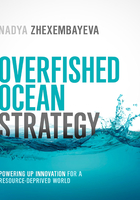
Chapter 1
Where Are the Fish?
The New Competitive Reality
AT A GLANCE
FOR MOST OF THE history of modern business, we have enjoyed falling prices on nearly all raw materials, which has made us dangerously oblivious to the shaky foundations of our global market economy But the tides are turning: the new era is upon us It is time to look into the facts—and to prepare a strategy for dealing with them.
Like his father and grandfather before him, Al Cattone has been living off the sea for all his life. For the Gloucester fisherman who spent over 30 years braving the Atlantic’s waters, fishing is “not so much a job as it is an identity.” But this legacy is coming to abrupt end. In light of extreme declines of cod stocks, the New England Fishery Management Council voted to slash cod catch rates by 77 percent in the area from Cape Cod to Nova Scotia. The destruction of fishing communities across the region is expected to follow, with a domino effect on seafood processors, wholesalers, distributors, and retailers—an entire industrial ecosystem. But the unpopular move is backed by the harsh reality that the cod stocks today are very far from healthy, with some communities netting a bare 7 percent of moderate targets set by the National Oceanic and Atmospheric Administration.
But this legacy is coming to abrupt end. In light of extreme declines of cod stocks, the New England Fishery Management Council voted to slash cod catch rates by 77 percent in the area from Cape Cod to Nova Scotia. The destruction of fishing communities across the region is expected to follow, with a domino effect on seafood processors, wholesalers, distributors, and retailers—an entire industrial ecosystem. But the unpopular move is backed by the harsh reality that the cod stocks today are very far from healthy, with some communities netting a bare 7 percent of moderate targets set by the National Oceanic and Atmospheric Administration.
In his struggle and sadness, Al is not alone. In the United Kingdom, the modern fishing fleet must work 17 times harder for the same catch as its sail-powered 1880s counterparts. In northern Japan, the entire fishing industry has been in “terminal decline,” with the 2011 tsunami only accelerating the collapse.
In northern Japan, the entire fishing industry has been in “terminal decline,” with the 2011 tsunami only accelerating the collapse. Recently, the Financial Times has become one of the most prominent voices about the fish crisis, warning the world of the decline in fish stocks, which is more severe than predicted. “More than half of fisheries worldwide face shrinking stocks, with most of these in worse condition than previously thought, leading to yearly economic losses of $50bln.”
Recently, the Financial Times has become one of the most prominent voices about the fish crisis, warning the world of the decline in fish stocks, which is more severe than predicted. “More than half of fisheries worldwide face shrinking stocks, with most of these in worse condition than previously thought, leading to yearly economic losses of $50bln.” And if the proven losses of the present are not enough, the projected losses of the future exceed anything that could be imagined. According to a Stanford University study, overfishing could take all wild seafood off our tables by 2048. “Unless we fundamentally change the way we manage all the oceans’ species together, as a working ecosystem, then this century is the last century of wild seafood,” warns marine biologist Stephen Palumbi.
And if the proven losses of the present are not enough, the projected losses of the future exceed anything that could be imagined. According to a Stanford University study, overfishing could take all wild seafood off our tables by 2048. “Unless we fundamentally change the way we manage all the oceans’ species together, as a working ecosystem, then this century is the last century of wild seafood,” warns marine biologist Stephen Palumbi.
In its easy math and empty-plates impact, the story of fish serves as a perfect metaphor for the entire world of resources our economy is built on. Whether it is fish or oil, clean water or gold, vitamin C or helium, the ocean of resources is running dry, and this is creatinghavoc in the market worldwide. Not one, not two, but three oceans are getting overextended: the ocean of resources, the ocean of waste, and the ocean of ideas. Here is how.